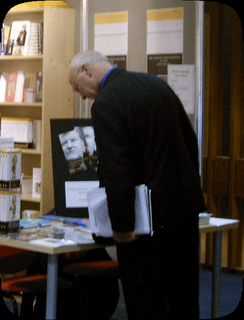
We try not to be totally negative in our comments, so as a counter-balance to the previous posting, here are some names of journalists who have given the conference serious coverage.
Serious, but not earnest, a thought which naturally leads to the name of Michael White (pictured) of the Guardian. His public interview of Ming Campbell at the conference was a model of what these things should be: probing, not hectoring; and conducted with humour, but not maliciously so. Trivia there was, but it formed only a small part of the interview.
White's sympathies are clearly with Labour. He is an Atlanticist, rather than a European, and he also disagrees with us over proportional representation, but he is a fair reporter of the old school.
Another good old-fashioned journalist is Patrick Hannan. His style on Radio Wales' "Something else" and "Call to Order" is also to probe with humour.
More acerbic is Andrew Rawnsley, who nevertheless was fair in chairing a lively Brighton fringe debate on the Liberal Democrats and the media. It is hard to discern where Rawnsley's sympathies lie, but the impression that he is particularly tough when interviewing prominent LibDems, suggests that he might be a closet party follower.
A usually quite partisan Labour supporter is Steve Richards of The Independent. However, in his column of 21st September, he discussed dispassionately Liberal Democrat tax policies and their implications for cooperation with other parties in the event of a balanced parliament.
"Anyone who listened to the [tax debate] would recognise this is a left-of-centre party, gripped by the need to redistribute widely, and to raise cash for some expensive spending commitments, such as the abolition of top-up fees for students," Richards wrote.
"Those speaking in favour of the new economic package argued passionately that the proposals redistributed more extensively than the party's previous policies. Opponents of the proposals protested that there was a need to redistribute more widely still."
Richards added: "It was a good debate, and one the two bigger parties would be too scared to stage."
Finally, David Hencke, the Westminster correspondent of the Guardian, cuts through the superficial assessments of the party and our leader.
Of the Liberal Democrats, he writes (in "The House Magazine"): "They have lost support in the [opinion] polls, but not in elections. Since Menzies' leadership, they have taken a seat from Labour in Dunfermline and came within 600 votes of taking Bromley & Chislehurst from the Tories. Neither of these results - particularly the slump in Tory support in outer London - were picked up in the Westminster village. And council by-elections show a similar trend."
And on Ming Campbell: "His detractors cite his age, his laid-back approach, and fear that when it comes to the next general election, he will perform badly in comparison with the dynamic young David Cameron and the experienced and streetwise Gordon Brown. His supporters think his
What these writers have in common is the perception that elections are not just a horse-race, but are about people and policies, and that few men and women go into politics as knaves and liars.
- Frank Little



No comments:
Post a Comment